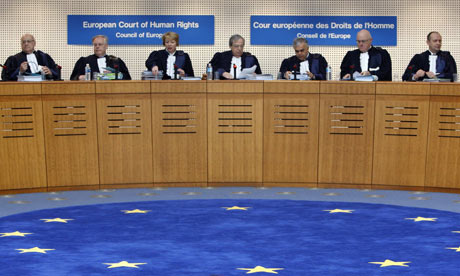British judge slams UK 'xenophobia'
Sir Nicolas Bratza criticises hostility of senior government figures towards European Convention on Human Rights
Britain's most powerful judge has publicly complained about "senior members" of the UK government fostering hostility towards the European Convention on Human Rights.
Citing the "vitriolic" and "xenophobic fury" directed against judges on the European Court of Human Rights, Sir Nicolas Bratza has acknowledged that relations between Strasbourg and the supreme court in London are under "strain".
Sir Nicolas, the UK's own nominee on the court and currently its president, made his comments at a conference earlier this year but they have only recently been published in a law journal. The paper has been referred to approvingly several times this month by supreme court judges.
Circulation of the full text of Bratza's "personal views" comes as the British government takes on the rotating chairmanship of the Council of Europe, which oversees the ECHR. The government has pledged to reform its practices.
Ministers have highlighted the massive backlog of cases building up in Strasbourg and implied that the "margin of appreciation" allowed to each country in interpreting the human rights convention in different national ways is too narrow.
The attorney general, Dominic Grieve, has also promoted the notion of legal "subsidiarity",particularly over the disputed issue of prisoners' voting rights, arguing that sensitive issues of social policy should be decided by national parliaments. The justice secretary, Ken Clarke, has questioned whether "every individual" should be allowed to appeal to the ECHR on deportation cases.
Last week the government convened a special conference at Wilton Park, the foreign office conference centre in Sussex, to "initiate" what a spokesman said was "a process of strategic thinking about the future role of the [European Court of Human Rights], to ensure its sustainable functioning in the long term". The FCO statement added that: "Participants will be encouraged to think creatively about the long-term future of the court."
Bratza's detailed examination of the relationship between the UK and the Strasbourg court was written before the Wilton Park conference and before the attorney general set out the government's reform agenda.
The president of the ECHR clearly intended that his comments should soothe the strained relationship but his definition of what lies within the remit of the Strasbourg is unlikely to be welcomed by many ministers.
"The scale and tone of the current hostility directed towards the [ECHR] and the convention system as a whole, by the press, by members of the Westminster parliament and by senior members of the government has created understandable dismay and resentment among the judges in Strasbourg," Bratza wrote.
"The vitriolic – and I am afraid to say, xenophobic – fury directed against the judges of my court is unprecedented in my experience, as someone who has been involved with the convention system for over 40 years."
Bratza stressed that many landmark decision by UK courts had been adopted by the ECHR as significant precedents and pointed out that in 2010 there were 1,200 applications from the UK considered by the ECHR of which 1,177 were struck out or deemed inadmissable. Of the remaining 23 cases, "several ended in findings of no violation" by UK authorities.
There should be closer dialogue between the Strasbourg and the UK's supreme court, he added. The ECHR should, he conceded, "show greater awareness of the consequences of its judgments" on domestic laws across Europe and "strive for greater clarity" in their judgments.
"But," Bratza continued, "the fact remains that we do not always agree with the supreme court or they with us and it is this which has sometimes put the relationship between the national courts and Strasbourg under strain.
"It is these cases which have given rise to the principal criticisms made against my court: that we too often sit as a court of fourth instance and pay insufficient regard to the principle of subsidiarity; that we cannot resist the temptation of deciding matters which properly fall within the margin of appreciation of a state; and that we are not sufficiently sensitive to national traditions and well-established laws and practices within a particular society.
"As an overall assessment of our court's work, I have to say that I do not find the criticisms to be fair ones."Bratza takes issue with the apparently resentful epigram coined by the late supreme court justice Lord Rodger: "Argentoratum locutum: iudicium finitum – Strasbourg has spoken, the case is closed". (Argentoratum was the Roman name for Strasbourg).
Bratza said: "Brilliantly Latinised as was the sentence... [this] is not the way which I or my fellow view the respective roles of the two courts.. " Although, he added, it was "important" in that case that the House of Lords should follow the ECHR decision.


1 comment:
It's not xenophobia and this is a typical slide and slur from them. Many of us love people on the continent and elsewhere - it's just that we don't like an unelected Marxist EU and all its offshoots ripping us off. Different other thing altogether.
Post a Comment